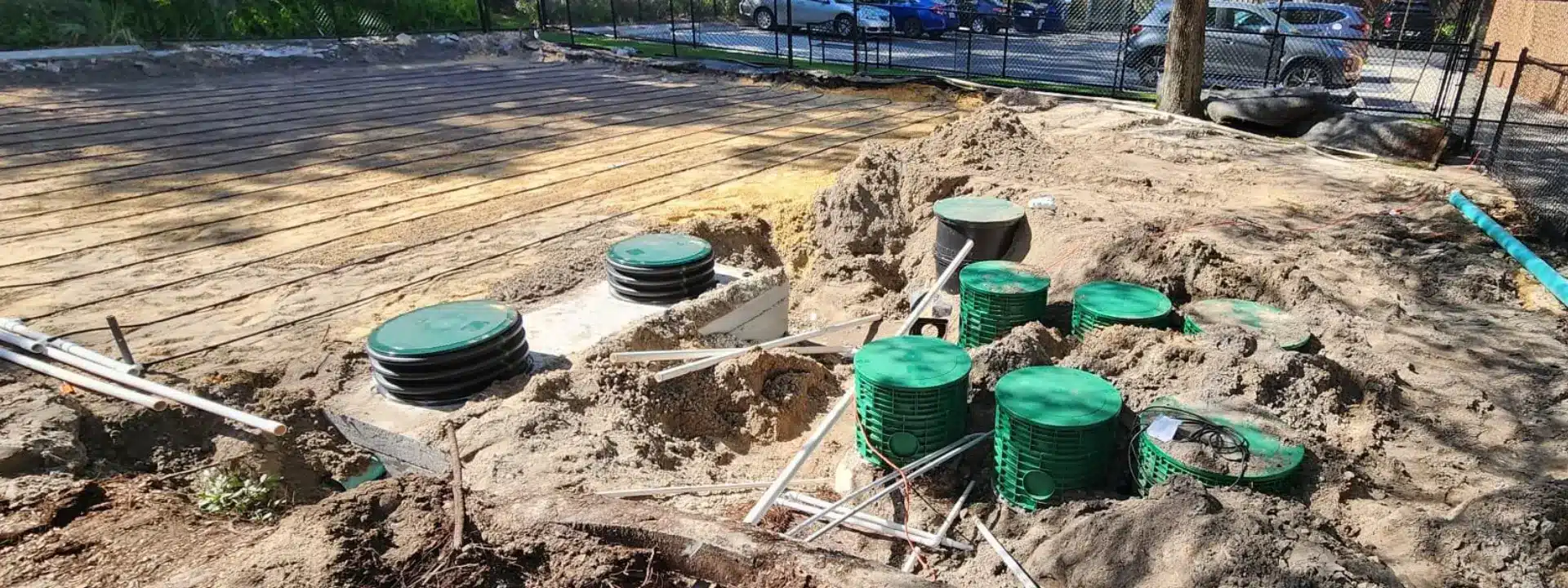Florida, renowned for its lush landscapes and vibrant ecosystems, faces unique environmental challenges, particularly in wastewater management. A key element in overcoming these challenges is the effective functioning of drainfields within septic systems. Let’s discuss why the science behind drain fields and their significance is essential for maintaining Florida’s natural beauty and environmental health.
The Science Behind Drain Fields: How Drain Fields Work
Drain fields utilize several biological, chemical, and physical processes that work together to treat and dispose of wastewater effluent from the septic system. Here’s a breakdown of the key scientific principles:
Biological Processes:
- Microbial Decomposition: Soil microorganisms play a vital role in breaking down organic matter in the effluent. These microorganisms consume organic pollutants as food, converting them into carbon dioxide, water, and biomass.
- Pathogen Removal: The soil also acts as a biological filter, trapping and removing pathogens such as bacteria and viruses. The pathogens are either filtered out by soil particles or die off due to lack of nutrients or predation by other microorganisms.
Chemical Processes:
- Adsorption: Soil particles, especially clay, have a negative charge that attracts and holds onto positively charged ions (cations) from the effluent, such as ammonium, heavy metals, and phosphorus. This process helps remove these pollutants from the water through a process called adsorption.
- Nutrient Transformation: Soil chemistry changes certain nutrients in the effluent into forms less harmful to the environment or more accessible to plant uptake, such as converting ammonium to nitrates, which plants can readily absorb.
Physical Processes:
- Percolation: The effluent gradually moves downward through the soil layers, driven by gravity. This process allows for further effluent treatment as it moves toward the groundwater.
- Filtration: As effluent percolates through the soil, fine soil particles physically filter out suspended solids and particulate matter, preventing them from reaching groundwater.
Hydrological Considerations:
- Evapotranspiration: Some of the water in the effluent is taken up by plant roots and transpired through leaves, while some evaporates directly from the soil surface. This process can significantly reduce the volume of wastewater and return purified water to the atmosphere as water vapor.
These interconnected processes ensure drainfields effectively treat septic tank effluent, making them a vital component of Florida’s wastewater management strategy to maintain the health of the state’s unique environments. Factors such as soil type, climate, and the size of the drain field are critical in determining the efficiency of these processes and the overall performance of the septic system.
Why Drainfields are Essential in Florida
Drain fields are particularly beneficial in Florida due to the state’s unique environmental and geological characteristics. Here’s why:
- High Water Table: Florida is known for its high water table and frequent heavy rainfalls. Properly functioning drain fields help manage wastewater in such conditions, ensuring effective treatment and dispersal of effluent, thus preventing the potential for groundwater contamination.
- Sensitive Ecosystems: Florida’s ecosystems, including its wetlands, springs, coral reefs, and coastal waters, are particularly susceptible to pollution. Drain fields provide an additional treatment stage for septic system effluent, reducing pollutants like nitrogen and phosphorus that could harm these delicate ecosystems.
- Soil Composition: The state’s diverse soil types, including sandy soils, are beneficial for effective wastewater dispersal in drain fields. Sandy soils offer reasonable percolation rates, allowing for efficient filtration and treatment of effluent before it reaches the groundwater.
- Groundwater Protection: Given that a significant portion of Florida’s population relies on groundwater for their drinking water supply, properly treating wastewater via drain fields is crucial for protecting public health and preventing the contamination of these water sources.
- Sustainable Water Management: Drain fields facilitate the gradual release of treated effluent back into the environment, which can contribute to recharging the aquifer and promoting a sustainable water cycle. This is particularly important in Florida, where water conservation and sustainable management practices are vital to addressing the challenges of water scarcity and population growth.
- Regulatory Compliance: Florida’s environmental regulations often require septic systems to include advanced treatment processes, especially in environmentally sensitive areas. Drain fields are critical in meeting these requirements by providing effective effluent treatment and helping property owners comply with local and state wastewater management standards.
- Cost-Effectiveness: Compared to other wastewater treatment options, septic systems with drain fields are a cost-effective solution for rural and suburban areas in Florida. They require less infrastructure than sewer lines and can be more affordable to install and maintain, while still providing effective wastewater treatment.
Best Practices for Drainfield Maintenance
To maximize the benefits and longevity of your drainfield, consider these maintenance tips:
- Regular Inspections: Conduct periodic inspections with professionals like ACE Septic & Waste to catch and address potential issues early.
- Water Conservation: Limit water usage to avoid overburdening your drainfield, which can lead to system failure.
- Proper Waste Disposal: Be mindful of what goes down your drains. Non-biodegradable items, excessive chemicals, and grease can harm your septic system and drainfield.
- Landscaping Do’s and Don’ts: Choose shallow-rooted plants around your drainfield and avoid heavy machinery or construction that could compact the soil.
Need a septic inspection? Call ACE Septic!
Drain fields are an important element in Florida’s environmentally responsible wastewater management approach. Their ability to efficiently process and treat effluent makes them indispensable for protecting the state’s precious water resources and ecosystems. Regular maintenance and mindful usage of septic systems are vital to ensure drainfields function correctly.
If you have any concerns or needs related to your septic system and drainfield, don’t hesitate to get in touch with ACE Septic & Waste. Our team of experts is dedicated to providing top-notch service and ensuring your septic system contributes positively to Florida’s environmental sustainability.







